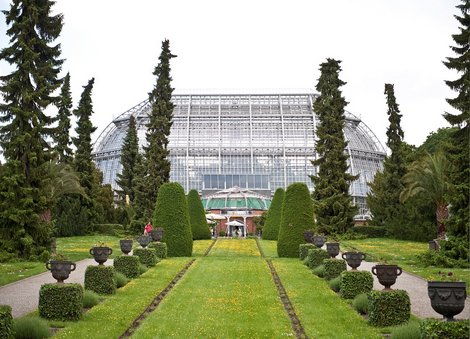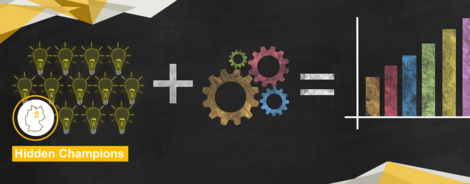From Saxony-Anhalt to Dubai
The Euroglas Group is one of the largest glass manufacturers in Europe.

Euroglas AG in Osterweddingen exports its float glass products around the whole world. You could say it is another “Hidden Champion” from Saxony-Anhalt, but given it is so active on the global stage, “hidden” is perhaps not the right word. The demand for its high-tech material is constantly growing.
You can find products from Saxony-Anhalt everywhere – sometimes they are almost invisible, and sometimes they are striking. The magnificent, shining glass produced in Osterweddingen is visible around the whole world. Prime examples are the Soldier Field Stadium in Chicago and the American Copper Buildings in New York. It also adorns the Mall of the Emirates in Dubai and the Palm House in Berlin. A more local example is the BMW car dealer Schubert Motors in Magdeburg.
The glass is manufactured in Osterweddingen, just on the doorstep of the state capital Magdeburg. In 2006, Glas Trösch Holding AG put the site into operation under the name Euroglas AG. Together with other sites in Haldensleben (also in Germany), Ujazd (Poland) and Hombourg (France), it is one of Europe’s largest glass manufacturers. That’s what makes it one of the Hidden Champions of Saxony-Anhalt. But “hidden” perhaps doesn’t do the glass manufacturer justice: as the examples above clearly show, Euroglas is no stranger on the global stage. “The fact is that we don’t tend to shout about ourselves from the rooftops – unless we are trying to attract new talent. We have been pretty successful in that department too over the past years,” says Christian Winter, Managing Director of the sites in Osterweddingen and Haldensleben. But one thing is clear: the title of “Champion” is spot on.
Specializing in float glass
The site in Osterweddingen specializes in manufacturing float glass. “Float” refers to the tin bath on which molten glass is cooled in order to produce a surface that is as even as possible. The delicate material, which is produced at temperatures above 1,500°C and contains substances such as silica sand, lime and dolomite, forms the basis of many glass products, such as laminated safety glass, which is also manufactured in Osterweddingen. Winter says that the different types of glass produced can be used in a wide range of different areas worldwide. The possible applications are so numerous that it’s difficult to list them all – it’s best to give just a few examples. Indoors, the glass can be used in glass stairs, mirrors and cabinets, and outdoors it can be used for façades and roofs; in industry, it can be used as support glass for solar modules or for navigation devices in the automotive industry; other possibilities are safety glass and insulating glazing. According to Winter, glass is a wonderful material that has many diverse uses: “It can, for example, help save energy when heating and cooling buildings without reducing our all-important daylight. This makes it a very sustainable product that helps protect the world we live in.”
Glass is defined by science as a solidified liquid that has not crystallized. The float glass manufacturing method has been in use since around 1960. It is based on high-quality silica sand, which is available in almost limitless reserves around the world. Soda, sulfite, dolomite and lime are other components in the raw material. Recycled glass cullet is added to it before it is melted down. The molten mass is then moved to the tin bath, where a smooth surface forms.
The entire value chain is carried out at the site in Osterweddingen, from mixing the raw materials, melting them down and the forming and the cooling process to the cutting and loading. Several hundred metric tons of glass are manufactured each day. The sector-specific standardized sizes and thicknesses are always available from the warehouse, which enables short and customer-friendly delivery times. The fact that the site is well connected for logistics and has easy access to raw materials convinced the Glas Trösch Group to locate to Saxony-Anhalt. “The area also offers excellent and dedicated workers,” adds Winter.
Roots in Switzerland
Euroglas’s roots go back more than one hundred years. The foundations for Glas Trösch were laid in 1905 in Bützberg, Switzerland. The then small handicraft business has now become a global player with 6,000 employees. Managing Director Winter is optimistic about the future: “Over the past decades, glass has become a truly high-tech material. Basic glass can be used to make an increasing range of intelligent products for use in a wide variety of fields. The spectrum ranges from buildings and vehicles to technical glass. As the range of applications increases, so too does the demand. We believe our task is to act as reliable suppliers of high-quality glass for the market, thus helping to safeguard our site for the long term.”
Anja Falgowski/IMG Saxony-Anhalt

In many industries, they belong to the innovation drivers in Europe and they are regarded as the originators of Germany's export success. As small to medium-sized companies, they often bring their niche applications to the world market faster than large companies, mostly resulting from in-house research. This self-developed success is one of their secrets.
